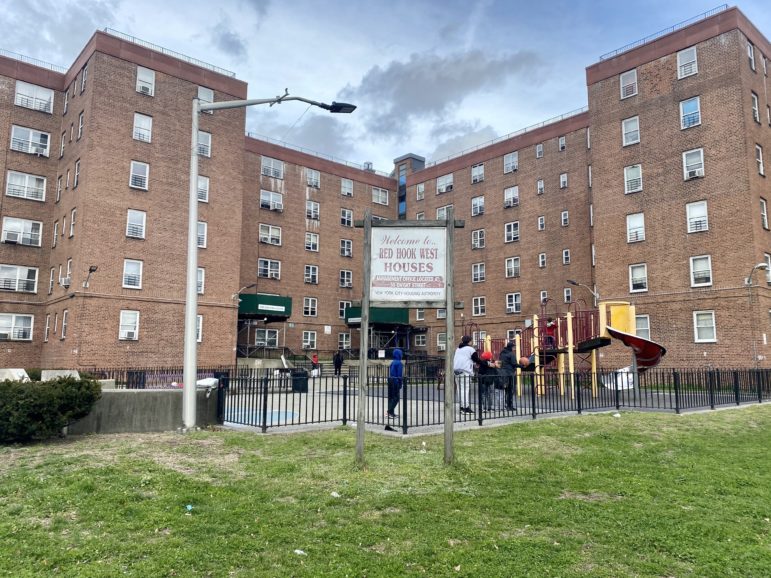“If you charge someone less than what they’re supposed to be paying they might not shout about it quite as loudly,” said Comptroller Brad Lander, whose office conducted the review of rent at Red Hook Houses. “Undercharging people relative to their income, they might not complain, but then the agency might not have the money it needs.”

Sadef Ali Kully
The Red Hook Houses, the largest NYCHA development in Brooklyn.An audit conducted by Comptroller Brad Lander’s Office found that one in five (19 percent) of sampled rents at Red Hook East and Red Hook West Houses in Brooklyn were miscalculated between October 2021 and 2022.
Lander’s office first heard the murmurs of error last summer when conducting a series of surveys, roundtable discussions and town hall meetings at several NYCHA campuses including Bronx River Houses, Coney Island Houses and Red Hook Houses.
“We heard a lot from all of them about vendors and repairs, rats and sanitation, but the one issue that really stuck out at Red Hook more than others was about rent calculations,” Lander said.
During one of the town hall meetings, Lander remembers several residents raising concerns about inaccuracies with their cost of rent. The comptroller saw even more tenants nodding their heads in agreement as they spoke along with a chorus of “mhms” that affirmed it was an issue his office needed to look at closer, he said.
In December, Lander brought in 21 NYCHA residents across all five boroughs to create a resident-led audit team.
Over the past six months, the auditors looked at a sampled number of households at Red Hook East and West to scope out whether NYCHA accurately calculated rent based on income for the group of households that saw an increase. Of the 2,692 occupied units at the campus, 853 units (32 percent) saw rent increases compared to October 2021, and 462 apartments had a rent increase of more than $26.
For the audit, 102 apartments were sampled and auditors discovered that NYCHA overcharged three apartments. Two of the households had a miscalculation under just $1, according to NYCHA. Together, the three households paid $439 more in monthly rent over the course of the year, according to the audit, ranging from $125 to $184 per unit.
NYCHA undercharged another 17 households, totaling $1,395 in monthly rent over 12 month period. Three of those apartments were together undercharged more than $100 per month, four apartments were charged between $50 to $100 less per month and 10 apartments were undercharged less than $50 a month, according to the audit.
“It’s worth noting that there’s a meaningfully greater number of undercharges than overcharges,” Lander said.
The discrepancy happened because NYCHA understated household total gross income for 12 apartments, and overstated household deductions for five units, according to the audit.
Deductions are subtracted from the annual gross income. For instance, households with minors under the age of 18 can get $480 deducted for each dependent, as well as other deductions if a household includes a senior or a person living with a disability.
While the miscalculations were off by small amounts per unit, the mismatch could have wider implications for a sprawling system like NYCHA, which as struggled to shore up funding and collect rent from tenants in recent years.
“If you charge someone less than what they’re supposed to be paying they might not shout about it quite as loudly,” Lander said. “Undercharging people relative to their income, they might not complain, but then the agency might not have the money it needs.”
One-third of NYCHA’s operating expenses come from rent revenue. Since the pandemic, the housing authority has seen rent payments drop and arrears mount, with NYCHA collecting rent from just 63 percent of households in April, metrics show.
While the state budget allocated millions in rent relief for NYCHA tenants—who were prioritized last under the pandemic Emergency Rental Assistance Program (ERAP)—it won’t be enough to cover all of the rent owed, which officials last month put at $501 million.
Rent for NYCHA residents is typically set at 30 percent of a household’s gross income, or a flat rent which—the maximum cost of rent charged based on the number of bedrooms—whichever is lower, with adjustments for potential deductions or credits.
Rents can be adjusted annually during a resident’s recertification process at the management office. NYCHA’s Management Services Department reviews yearly recertifications through its Quality Assurance Unit, according to the housing authority. Through a “random sampling” the unit checks to see if verification methods, income determination and rent calculations meet HUD requirements.
Resident information and documentation are stored in a system called Siebel, first implemented in 2009. The system also generates the Public Housing Lease Addendum and Rent Notices after the recertification process has been completed.
Auditors found that in four instances, the Public Assistance Income displayed on the Rent Notices did not reflect the amounts used to calculate upcoming rents.
In response to the audit, NYCHA stated that according to HUD guidelines, overstatement or understatement of rent that falls below the $60 threshold is “de minimis” or minimal and by those standards, the housing authority “substantially” overstated rents for two apartments and “substantially” understated seven apartments.
The Comptroller’s Office sent four recommendations for the housing authority, including the review of rent calculations to determine whether “corrective action” should be taken, periodic training to staff, regular testing of rent calculations and a system review for Siebel to ensure accuracy.
“We will work with the appropriate residents to correct rents going forward and provide a credit to every resident who overpaid rent—no resident will be asked to pay back rent,” a NYCHA spokesman wrote in an email. “We will work with the Comptroller to review and improve our processes in order to continue our focus on providing a better quality of life to New Yorkers in public housing.”
The comptroller’s resident-powered audit team is planning additional probes into NYCHA contractors and eviction rates at RAD-PACT developments








